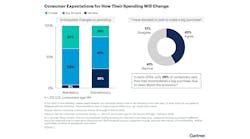Import cargo volume at the nation’s major retail container ports will be a full 25% higher during the first half of 2010 compared with the same period a year ago, according to the monthly Global Port Tracker report from the National Retail Federation and Hackett Associates.
“This is a dramatic turnaround over what we’ve seen during the past two years,” says Jonathan Gold, NRF’s vice president for supply chain and customs policy. “Increases in import volumes don’t correspond directly with dollar volumes in sales, so caution has to be exercised when looking at these numbers. But retailers are clearly expecting to move more merchandise this year.”
U.S. ports handled 1.09 million twenty-foot equivalent units (TEUs) in December 2009, the latest month for which actual numbers are available. That was unchanged from November but up 2.6% from December 2008 to break a 28-month streak during which monthly totals were lower than the same month the year before. One TEU is one 20-foot cargo container or its equivalent.
January 2010 was estimated at 1.19 million TEU, a 17% increase over January 2009, and February, traditionally the slowest month of the year, is forecast at 1.1 million TEU, up 30% from the previous year. March is forecast at 1.18 million TEU, up 23% as retailers begin to stock up for spring and summer, April at 1.25 million TEU, up 27%, May at 1.3 million TEU, up 26%, and June at 1.38 million TEU, up 36%.
Those monthly numbers would put the first half of 2010 at 7.4 million TEU, up 25% from last year’s 5.9 million TEU.
With numbers from December now final, 2009 ended with a total volume of 12.7 million TEU, down 17% from 2008’s 15.2 million TEU and the lowest since the 12.5 million TEU reported in 2003.
Hackett Associates founder Ben Hackett disagrees with economists who fear that the economy is in the middle of a W-shaped recovery where another dip could follow current signs of an upturn. “This forecast assumes that we are not in a double-dip recession and that a recovery is underway,” Hackett says. “Although 2009 saw decreased import activity levels, the forecast for 2010 points towards growth.”
Global Port Tracker, which is produced for NRF by the consulting firm Hackett Associates, covers the U.S. ports of Long Angeles/Long Beach, Oakland, Seattle and Tacoma on the West Coast; New York/New Jersey, Hampton Roads, Charleston and Savannah on the East Coast, and Houston on the Gulf Coast.


